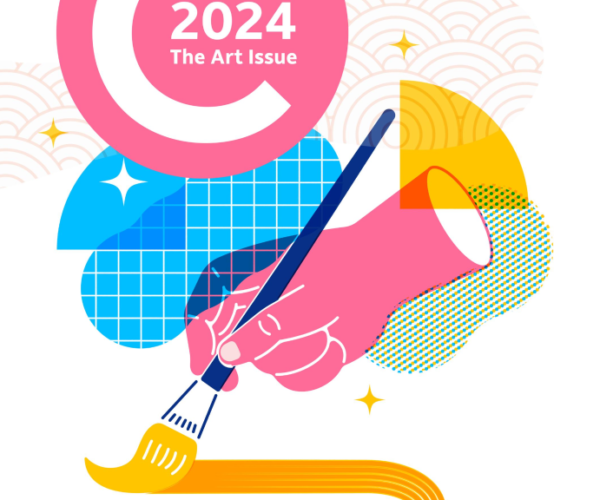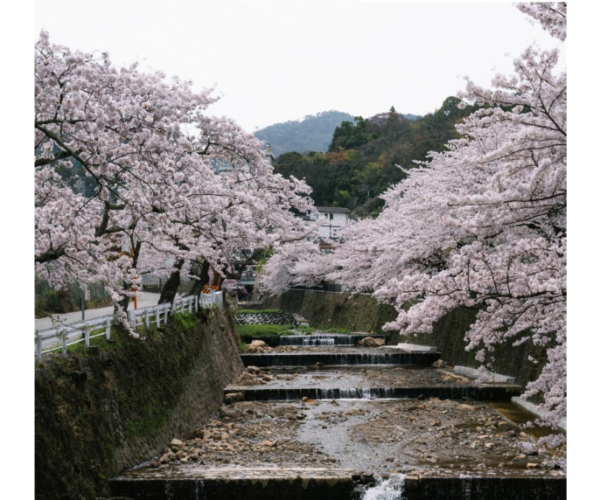This article originally appeared in the February 2024 issue of CONNECT.
Veronica Nielson (Hiroshima)
Known as a pop culture powerhouse in the world, it’s no secret that Japan delivers plenty of quality entertainment from anime, films, manga, and more. Lately, Japanese popular music has garnished more attention on the internet worldwide due to younger artists entering the Japanese music industry. YOASOBI, Fujii Kaze, and others are among those artists. But one who has achieved massive success before her 21st birthday this year is Ado, a Japanese solo artist who keeps her face hidden from the public and releases contemporary popular music. What do fans know about Ado, and why is she garnishing so much success at such a young age?
Born on October 24, 2002, Ado shared with her fans that her interest in music started when she gained inspiration from other anonymous singers, who covered famous songs without showing their faces on the popular video platform Niconico. Shortly after watching countless videos on the site via her Nintendo DS, Ado decided to try covering songs herself as an utaite, a singer who covers songs by other artists. These covers may often include songs from Vocaloid, anime, video games, and other popular media posted on Niconico or YouTube. Given that Ado lived in a home with limited space, she bought soundproof material, set it up inside her closet, and recorded her music there. After releasing multiple covers of songs by other Japanese artists, Ado quickly captured many viewers’ attention on Niconico.
Following this success, she recorded her first song, “Usseewa” (which would later go with her first studio album, “Kyogen”, released in 2022,) at age 17, which is an energetic song that resonates with many younger Japanese people and their frustrations they cannot easily vocalize toward the stressful shakaijin (society member) culture of Japan. The song has a distinctive composition, as Ado sings in a soft and innocent voice in one verse but quickly switches to an apathetic or growling tone in the next. Ado’s willingness to take a risk in voicing her criticisms toward this component of Japanese culture worked in her favor, as the song proved a massive hit among Japanese listeners.
After receiving a mainly positive reception with her first album, Ado also revealed that she sang the vocal songs featured in One Piece Film: Red, which helped the movie obtain one of the largest opening sales weekends in Japanese cinema’s history. Performing the musical vocals for Uta, a main character in the film, Ado demonstrates her ability to earn an opportunity to provide music for a popular anime/manga series like One Piece, which is impressive for her age and relatively young musical career.
While Ado has plenty more room for experimentation with her music and growth, her music and persona as an artist will likely continue to give Japanese popular music a more positive image among Japanese and international fans. With similar artists like Yama who remain anonymous and gain many fans through their music, Ado has demonstrated through her album, concert ticket sales, and her significant voice acting role for One Piece Film: Red that musicians in Japan can simultaneously produce and release music and enjoy anonymity to preserve their privacy from the public.
Although anonymous artists like Ado and others have inspired newer singers to conceal their identities from the Japanese public, whether her decision to do this will influence a similar trend outside of Japan will be interesting to observe. Except for singers like Sia (who eventually revealed her identity before the public), many Western performers who don’t reveal themselves to others have not gained fame among fans as they have in Japan. As an American myself, I argue part of the reason the trend of anonymous singers has not caught on in much of the West is due to many fans’ burning interests in knowing the physical appearance of performers they admire. This is arguably true for many Korean pop fans who support solo artists or idol groups too. Given that Ado has stated on her All Night Nippon radio talk show that she wants to perform in America’s Coachella music festival one day, she may have potential to enjoy her anonymity as she extends her reach and builds her fanbase in the West. Nonetheless, if any newer Japanese artist can accomplish this endeavor, Ado is likely the only reputable singer who could do this.
Given her tremendous growth as a professional singer, Ado earned an excellent reception to secure an opportunity to perform at the Japan National Stadium next April. She will be the first female solo artist to sing music in the venue’s history, which is an honor. Shortly before, Ado will also embark on her first world tour titled “Wish,” spanning from February through April. With back-to-back concert performances, I look forward to watching how well Ado is received outside of Japan, specifically in countries like the United States and France, where Japanese music is gradually gaining more popularity. Although she has announced she will primarily travel around the United States, Western Europe, and Southeast Asia for the tour, Ado may garnish more success than many fellow Japanese artists who perform abroad as she introduces international fans to her hit songs like “Usseewa” and “Show,” which vastly differ from many Japanese pop songs that typically exclusively top music charts in Japan.
After decades of the Japanese music industry pumping out idol groups who share similar-sounding content, it has become increasingly evident among online communities that formulaic pop songs have grown stale among Japanese music fans in and outside of Japan. If Ado continues to explore a variety of musical genres, moods, and vocal styles, she will likely gain considerable recognition abroad in countries like the United States, France, and more. Ado has strong potential for standing among some of the first Japanese solo artists to achieve popularity there since Kyu Sakamoto’s “Ue wo Muite Aruko” dominated the US Billboard Hot 100 in 1963. Although her career is young, Ado’s ability to attract fans while performing songs inspired by different genres and her showcasing the same vocal techniques like growling that made her famous to begin with has given her a steady platform that will likely continue to elevate her career at a more rapid pace than many other Japanese popular performers have achieved.
Veronica Nielsen is a second-year Coordinator for International Relations (CIR) on the JET Programme in Hiroshima Prefecture. She has been to over half of Japan’s 47 prefectures and has made her way to visiting Shikoku for the first time this year. She aims to travel to Kyushu, the last main island she has yet to see, soon.



![CONNECT ART ISSUE 2024 SUBMISSIONS [CLOSED]](https://connect.ajet.net/wp-content/uploads/2024/04/ARTISSUE-INSTA-600x500.png)





